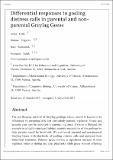Differential responses to gosling distress calls in parental and non-parental Greylag Geese
Abstract
The pre-fledging survival of Greylag goslings (Anser anser) is known to be influenced by parenting style and particularly parental vigilance. Visual and acoustic cues may be important in parental vigilance: if vision is blocked, for example in a highly structured habitat, acoustic recognition of the goslings by their parents would be beneficial. We confronted parental and non-parental Greylag Geese with playbacks of gosling distress calls and analyzed their behavioral responses. Parental geese showed a significant increase in their vigilance behavior during and after playbacks while geese without offspring showed increased comfort behavior. In a permutated discriminant function analysis, we found no family-specific vocal cues in gosling calls, and potential call familiarity did not have any effect on parental behavioral responses. Vigilance in families was further influenced by the number of goslings and gosling age, with increased vigilance when the number of goslings was high, and when goslings were younger. Parental females were more vigilant than parental males, suggesting differences in parental investment between males and females. We conclude that visual cues may be more important in offspring-related vigilance than calls, which elicited different behavioral responses depending on the social class of the geese.
Citation
Loth , A , Frigerio , D , Kotrschal , K & Szipl , G 2018 , ' Differential responses to gosling distress calls in parental and non-parental Greylag Geese ' , Journal of Ornithology , vol. 159 , no. 2 , pp. 401-412 . https://doi.org/10.1007/s10336-017-1521-0
Publication
Journal of Ornithology
Status
Peer reviewed
ISSN
2193-7192Type
Journal article
Rights
© 2017, Dt. Ornithologen-Gesellschaft e.V. . This work has been made available online in accordance with the publisher’s policies. This is the author created, accepted version manuscript following peer review and may differ slightly from the final published version. The final published version of this work is available at https://doi.org/10.1007/s10336-017-1521-0
Description
GS received funding by the Austrian Science Fund (FWF) projects Y-366-B17 and W-1234-G17. AL was funded by the Austrian Federal Ministry of Science, Research and Economy (BMWFW, former BMWF) project SPA/03-005/Graugänse and DF by the Austrian Science Fund (FWF) project P-21489-B17.Collections
Items in the St Andrews Research Repository are protected by copyright, with all rights reserved, unless otherwise indicated.

